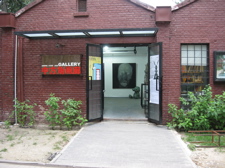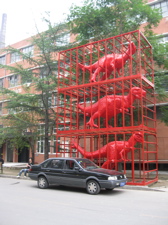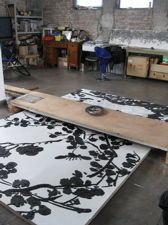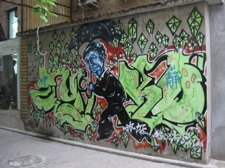We arrived in Beijing by plane from Chengdu. Refunding the train tickets was a necessity: we heard the tracks were flooded in Mianyang.

One of 798's many galleries.
I was ready to leave Chengdu. We had spent the previous two afternoons lounging at teahouses where endless cups of tea went for about 1 US dollar. We sat in the thick humidity, caught in the languor that Chengdu invariably causes during mid-summer. Older women chatted over their tea and snacks, and we invited them to play "Beat the Landlord" (斗地主), a popular card game that requires 3 players. Independent vendors offered to clean our ears with long metal utensils ?a thought that still makes me shudder. We cracked sunflower seeds and sipped our tea slowly; our table gave us license not to be hassled too much by the roving vendors. Others noisily paddled boats on the lake beside us, though we did not envy their forays below the naked sun. We were content to sit in the shade of climbing plants, even if leaves would occasionally fall in our tea glasses.
The heat was so thick and oppressive in Chengdu that we were ready to welcome the higher temperatures of a less humid Beijing. We landed in the capital city ?me for the fifth time ?and I realized how little I knew about this place. Aside from our trip to meet Hillary Clinton last February, I had barely ventured out of the airport.
After taking a shuttle into the Chaoyang District, we searched for a cab driver that would take us to our hostel. Evidently the place we were staying was not well known by the local community, because we had to beg the second driver to call our hostel and speak to them in Chinese about the address ?even that yielded more confusion.

Dinosaur art, 798.
After a short drive, we found ourselves at 798, an entire district of art galleries, bookstores, cafes, art shops, and foreigners (many had made it a day trip). I had never heard about this place before, but according to a fellow resident of our hostel, "798 is the hub of Beijing's Avant-Garde art scene." She mentioned that, in the past several days, she had met a couple famous artists ("Beijing famous," she added).
I, of course, immediately rushed to the dictionary to look up, "Avant-Garde," and was disappointed that it had nothing to do with food.
Even for Beijing, this neighborhood is radical. According to our resident art expert, who is currently researching her thesis, this entire area was about to be demolished by the government in the early 2000s. What saved it? A growing appetite for art within the Beijing elite. It's good to have powerful friends with strong ties to the local government.

盛浩宇's current project (and studio).
The hostel itself is on the 3rd floor of a 4-floor studio. Our host, Haoyu Sheng (盛浩宇) lives here and runs the hostel with the help of his aunt - or at least that's how he referred to her; oftentimes 'auntie' means caretaker or nanny. His studio is located on the 4th floor, and he is currently working on a large oil painting. In terms of hostels I have visited around the world, this one is the best. My 'best' ranks things like small size, cool location, and at-home atmosphere very highly.
Haoyu Sheng has long hair, which he keeps in a ponytail. He smiles easily and speaks Mandarin Chinese so clearly that my Chinese ability seems to have improved overnight. I can actually understand him. He is very helpful, coming down from his studio regularly to give us information about train tickets, the post office, cheap restaurants in back alleys, or whatever we ask. He wears large glasses, periodically nudging them back to the top of his nose. Yesterday, while giving us a tour, he cheerfully showed us the coffee maker. "We have coffee here!" he said with a large smile. He also takes a special pride in his English; some of his phrases are spoken without an accent, my favorite being, "No problem!" He wears light, baggy shorts and an oversized t-shirt to combat the greenhouse effect of his studio in the summer.
This morning there was some commotion on the 4th floor, and we were invited with a yell, "The eclipse has begun!" We climbed the stairs, walked out to the roof, and sat gazing at the sky for a few moments before the Beijing haze swallowed the scene. I wondered what this looked like in Shanghai and Chengdu; even with cloudy skies, those cities were certainly dark for several minutes.

This place is the other side of the world from Guizhou, where any mention of art probably evokes images of a class struggle with the bourgeois during the Cultural Revolution. Landlords bent their heads. Landlords did the airplane. Art was burned. Cultures were looted. Beijing seems to be escaping its past much quicker than Guizhou, and that began with a more rapidly growing economy. For now we are living in the midst of Beijing's burgeoning art scene, and learning the vocabulary to go with it (notably: 'private art gallery'). The streets are filled with old factories from a time when this was the industrial district. The brick walls are covered with the kind of graffiti that most would welcome to their neighborhood, the spray-painted scenes more like oil on canvas than illicit mentions of 13th street.
Coming to Beijing after my time in Guizhou is proving to be immensely rewarding. The differences in this society are large and omnipresent. The people are noticeably taller, roads are more developed, and life runs much faster.
Article source: blog.seattlepi.com
***
Related links
The Commercial Future of 798 Modern Art District
M50 Creative Park: Putting culture back into Shanghai
Warning:The use of any news and articles published on eChinacities.com without written permission from eChinacities.com constitutes copyright infringement, and legal action can be taken.
All comments are subject to moderation by eChinacities.com staff. Because we wish to encourage healthy and productive dialogue we ask that all comments remain polite, free of profanity or name calling, and relevant to the original post and subsequent discussion. Comments will not be deleted because of the viewpoints they express, only if the mode of expression itself is inappropriate.
Please login to add a comment. Click here to login immediately.